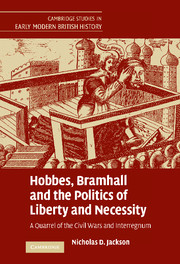 Hobbes, Bramhall and the Politics of Liberty and Necessity
Hobbes, Bramhall and the Politics of Liberty and Necessity Book contents
- Frontmatter
- Contents
- Acknowledgments
- List of abbreviations
- Note on dates and style
- Introduction
- 1 Bishop Bramhall, the ‘Great Arminian’, ‘Irish Canterbury’ and ‘Most Unsound Man in Ireland’, 1633–1641
- 2 Bishop Bramhall, the Earl of Newcastle, Thomas Hobbes and the First English Civil War
- 3 Hobbes's flight to France, De Cive and the beginning of the quarrel with Bramhall, summer 1645
- 4 An epistolary skirmish, 1645–1646: Bramhall's ‘Discourse’, Hobbes's ‘Treatise’ and Bramhall's ‘Vindication’
- 5 Bramhall and the royalist schemes of 1646–1650
- 6 Hobbes and Leviathan among the exiles, 1646–1651
- 7 The public quarrel: Hobbes, Of Liberty and Necessity, 1654, Bramhall, Defence of True Liberty, 1655 and Hobbes, Questions concerning Liberty, Necessity and Chance, 1656
- 8 Castigations of Hobbes's Animadversions and The Catching of Leviathan, 1657–1658: Hobbes as Leviathan of Leviathans
- 9 The Restoration and death of Bramhall and Hobbes's last word, 1668
- Conclusion
- Bibliography
- Index
- Cambridge Studies in Early Modern British History
9 - The Restoration and death of Bramhall and Hobbes's last word, 1668
Published online by Cambridge University Press: 17 July 2009
- Frontmatter
- Contents
- Acknowledgments
- List of abbreviations
- Note on dates and style
- Introduction
- 1 Bishop Bramhall, the ‘Great Arminian’, ‘Irish Canterbury’ and ‘Most Unsound Man in Ireland’, 1633–1641
- 2 Bishop Bramhall, the Earl of Newcastle, Thomas Hobbes and the First English Civil War
- 3 Hobbes's flight to France, De Cive and the beginning of the quarrel with Bramhall, summer 1645
- 4 An epistolary skirmish, 1645–1646: Bramhall's ‘Discourse’, Hobbes's ‘Treatise’ and Bramhall's ‘Vindication’
- 5 Bramhall and the royalist schemes of 1646–1650
- 6 Hobbes and Leviathan among the exiles, 1646–1651
- 7 The public quarrel: Hobbes, Of Liberty and Necessity, 1654, Bramhall, Defence of True Liberty, 1655 and Hobbes, Questions concerning Liberty, Necessity and Chance, 1656
- 8 Castigations of Hobbes's Animadversions and The Catching of Leviathan, 1657–1658: Hobbes as Leviathan of Leviathans
- 9 The Restoration and death of Bramhall and Hobbes's last word, 1668
- Conclusion
- Bibliography
- Index
- Cambridge Studies in Early Modern British History
Summary
Bramhall spent the last few years of exile in the Low Countries. That he was in Bruges at least briefly in 1658 is indicated in a letter of Joseph Jane to Edward Nicholas: ‘We have a small congregation here, but expect its increase by the return of some from Brussels … The Bishop of Derry is now with us, but will not stay long.’ In the summer of 1659 Bramhall was in Brussels. In 1659, Bramhall seems to have been exhibiting serious physical frailty. In a letter to John Barwick, dated 14 September 1659, Hyde noted: ‘The Bishop of Derry … is infirm and cannot live long.’ Charles's exile court had recently moved to Brussels. Bramhall must have been in frequent contact with the king, or at least with some of his closest advisors, particularly Ormonde. As for Bramhall's polemical pen, it was still busy, but no longer scribbling against Hobbes. After writing the lengthy Castigations and Catching of Leviathan, he seems to have paid no more attention to the philosopher. As the Restoration began to unfold, the bishop had much other difficult business with which to occupy himself. Naturally he was highly concerned about restoring the church in a Laudian way. He returned to England in the summer of 1660. A letter written in July shows that he was in London, and John Evelyn recorded his ‘saluting his old friend, the Archbishop of Armagh, formerly of Londonderry’, in the capital on 28 July 1660.
- Type
- Chapter
- Information
- Hobbes, Bramhall and the Politics of Liberty and NecessityA Quarrel of the Civil Wars and Interregnum, pp. 250 - 275Publisher: Cambridge University PressPrint publication year: 2007


